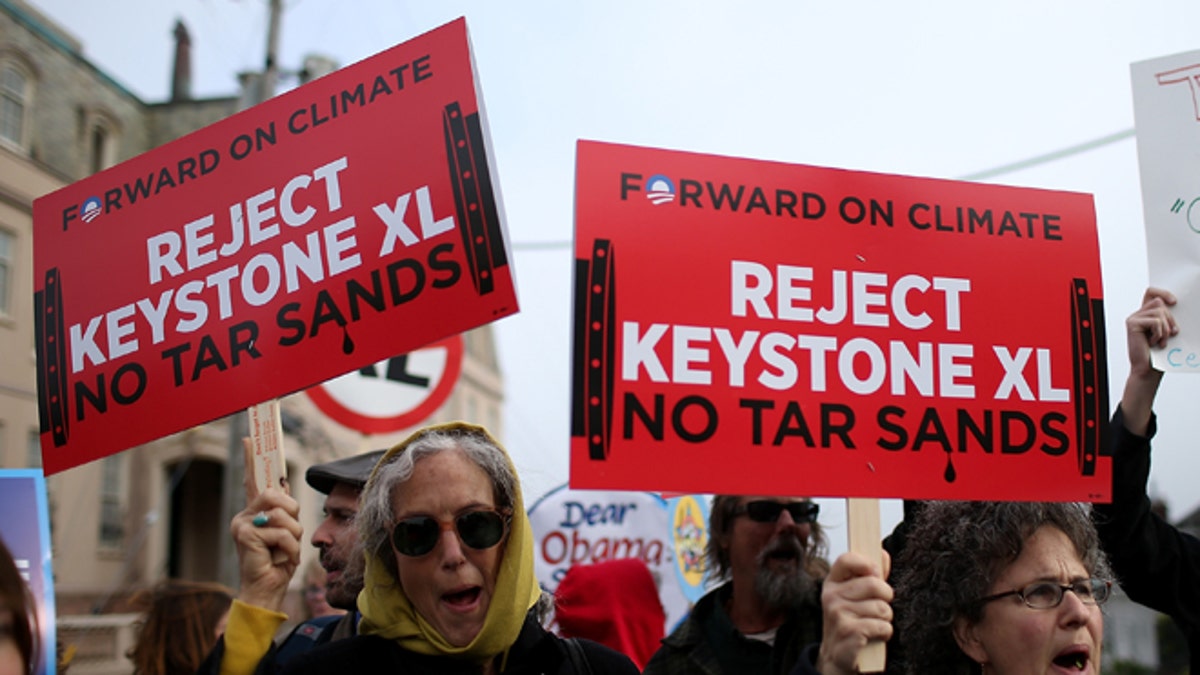
SAN FRANCISCO, CA - APRIL 03: Demonstrators hold signs as they protest near the site of a fundraiser on April 3, 2013 in San Francisco, California. Hundreds of protesters staged a demonstration against war and the Keystone XL pipeline outside of a fundraiser to be attended by U.S. President Barack Obama at the home of Ann and Gordon Getty. (Photo by Justin Sullivan/Getty Images) (2013 Getty Images)
A major Latino rights group has joined in the opposition to the proposed controversial Keystone XL oil pipeline, stating that it would not only exacerbate climate change but also harm the communities living near the tar sand refineries in the southern United States.
Arturo Carmona, executive director of Presente.org, made a statement last week condemning the Keystone XL pipeline and claiming the project would disproportionally impact Latino communities.
“We are calling on President Obama to reject the Keystone XL Pipeline,” said Arturo Carmona, Executive Director of Presente.org. “We urge the President to keep his promise to address climate change and start building a clean energy economy— and the first step to doing that is rejecting the Keystone XL Pipeline.”
While a Pew Research Poll released last month found that 61 percent of Americans were in favor of the pipeline, Presente.org recently polled their more than 300,000 members across the country and found that environmental justice and climate change were second only to immigration in importance to their members.
“Latino communities in America are concentrated in the areas most affected by climate change— from the drought-stricken southwest to coastal cities like Miami which are most threatened by rising sea levels,” Carmona said. “Additionally, refineries that would process KXL's tar sands are concentrated in Latino communities in Texas— sickening our children and families with their toxic pollution.”
The Natural Resource Defense Council also supported the findings by Presente.org in its own poll. About 92 percent of those polled by the NRDC supported calling for more use of renewable energy and 87 percent agreed that there should be limits on power plant pollution.
Eighty-eight percent added that it is “extremely to very important” for the government to tackle air pollution, and 75 percent added it was “extremely to very important” for the government to take action on climate change.
“We have not seen this degree of consistency and this degree of high support among Latino electorate,” except in polls on immigration reform, Matt Barreto, co-founder of Latino Decisions said during a press call.
The overwhelming opposition among the Latino community to the Keystone XL pipeline does not, however, appear to correlate into other environmental issues, such as the fracking.
Fracking, or hydraulic fracturing, is the controversial practice of sending a mixture of water, sand and chemicals down a wellbore to create small fractures underground in an attempt to release oil and natural gas. Supporters of the technique argue that it is a safe, clean way to extract resources and create much-needed jobs, while opponents argue that fracking is environmentally unsafe, causes numerous health issues and, once the shale deposits have been tapped, turn boomtowns into busts.
In Colorado, with 21 percent of the state’s population being Hispanic, advocates on both sides of the fracking issue have targeted the demographic in a bid to gain support. From Spanish-language websites to claims of high-paying jobs, Latinos have become a key demographic as communities – and the state as a whole – decide what to do with the shale.
Latino groups caught in the middle of this debate don’t see themselves as that much different in terms of their concerns from every other Coloradan. Hispanics are split down the environmental and economic divide that the rest of Colorado’s electorate is dealing with, said Amanda Gonzalez, the executive director of the Colorado Latino Leadership, Advocacy and Research Organization (CLLARO).
“For some it is a very contentious issue in regards to the environmental problem,” Gonzalez added, “while others in the community support fracking because of the jobs that it creates.”
Follow us on twitter.com/foxnewslatino
Like us at facebook.com/foxnewslatino




















